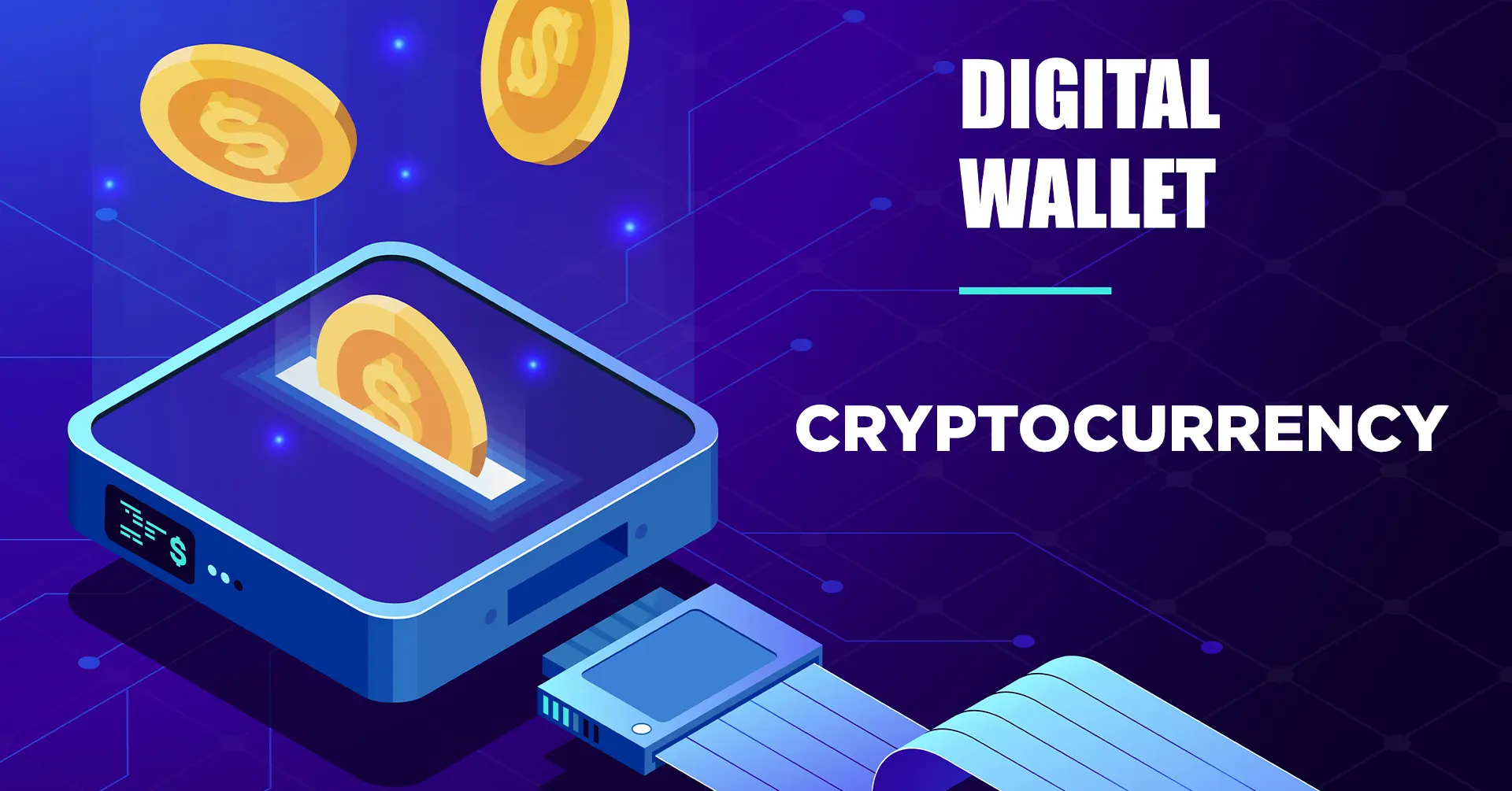Hello, my wonderful readers! Discover the world of Crypto Wallets and gain a comprehensive understanding of their significance in cryptocurrencies. In this detailed blog, we’ll delve into the ins and outs of Crypto Wallets, unraveling their purpose, types, security features, and how they empower you to manage your digital assets securely. Whether you’re a newcomer to the crypto space or a seasoned investor, this blog will equip you with the knowledge you need to navigate the fascinating landscape of Crypto Wallets.
What are Crypto Wallets?
Crypto wallets are digital tools individuals use to store, manage, and transact with their cryptocurrencies securely. These wallets provide a means for users to interact with various blockchain networks and hold their digital assets, such as Bitcoin, Ethereum, or other altcoins. Users can send and receive cryptocurrencies, monitor their balance, and keep track of their transaction history using these wallets. As technology evolves, different types of crypto wallets, including hardware wallets, software wallets, and online wallets, have emerged to cater to the diverse needs of cryptocurrency enthusiasts.
Features of Crypto Wallets
Crypto wallets offer a range of essential features that ensure the secure and convenient management of digital assets:
Private Key Management
One of the core features of crypto wallets is the ability to generate, store, and manage private keys. These keys grant access to your cryptocurrency holdings and transactions, making their secure management crucial.
Address Generation
Crypto wallets facilitate the creation of unique public addresses for receiving funds. These addresses serve as a secure way for others to send you cryptocurrencies.
Transaction Functionality
Active wallets enable users to initiate transactions by sending and receiving cryptocurrencies. They provide options to input recipient addresses, amounts, and additional transaction details.
Security Layers
Many crypto wallets implement robust security measures, such as encryption and two-factor authentication (2FA), to safeguard your private keys and prevent unauthorized access.
Multi-Currency Support
Some wallets support cryptocurrencies, allowing users to manage different digital assets within a single interface.
Backup and Recovery
Wallets often offer backup options to ensure you can recover your funds in case of device loss or damage. This typically involves creating a backup of your private keys or recovery phrases.
User-Friendly Interfaces
Active wallets come with user-friendly interfaces that make it easy for beginners and experienced users to navigate and manage their assets effectively.
Compatibility
Crypto wallets are designed to be compatible with different devices and platforms, including desktop computers, smartphones, and even hardware devices.
Offline Storage (Cold Wallets)
Hardware wallets, a crypto wallet, provide enhanced security by keeping your private keys offline, away from potential online threats.
Regular Updates and Maintenance
Reputable wallet providers frequently release updates to improve security, add new features, and enhance overall functionality.
Integration with DApps
Some wallets allow integration with decentralized applications (DApps) and blockchain platforms, enabling users to interact with various blockchain-based services.
Real-Time Balance Tracking
Most wallets provide real-time updates on your cryptocurrency balances and transaction history, helping you stay informed about your financial activities.
Crypto wallets combine a range of active features to ensure secure, accessible, and efficient management of your digital assets, providing you with the tools needed to navigate the world of cryptocurrencies confidently.
Benefits of Crypto Wallets
Crypto wallets offer a host of compelling benefits that empower users to effectively manage their digital assets and engage with the world of cryptocurrencies:
Enhanced Security
By allowing users to control their private keys, crypto wallets provide a higher level of security than leaving funds on centralized exchanges. Users have direct ownership and responsibility for their assets, reducing the risk of hacks and breaches.
Financial Sovereignty
Crypto wallets give individuals full control over their funds without relying on traditional financial intermediaries. This financial sovereignty empowers users to transact and manage their wealth independently, free from the constraints of traditional banking systems.
Privacy and Anonymity
Certain crypto wallets, such as privacy-focused wallets, prioritize anonymity by implementing advanced cryptographic techniques. Users can conduct transactions with a higher degree of privacy, shielding their transaction history from prying eyes.
Global Accessibility
Crypto wallets enable seamless cross-border transactions, allowing users to send and receive funds across the globe without intermediaries or currency conversion. This benefits individuals in regions with limited access to traditional banking services.
Portfolio Diversification
With support for various cryptocurrencies, wallets facilitate the diversification of investment portfolios. Users can hold and manage multiple digital assets, taking advantage of the potential growth opportunities in different blockchain projects.
Control Over Fees
Wallet users can choose transaction fees based on their preferences and urgency. This control ensures that users can prioritize faster confirmations or opt for cost-effective transactions, depending on the situation.
Decentralized Applications (DApps)
Certain wallets allow direct interaction with decentralized applications and smart contracts. Users can engage with a wide range of DApps, from decentralized finance (DeFi) platforms to digital collectibles and gaming applications.
Long-Term Investment
Hardware wallets, a crypto wallet, offer a secure and offline storage solution. This makes them ideal for users looking to hold cryptocurrencies as a long-term investment, minimizing the risk of online attacks.
Inheritance Planning
Crypto wallets allow users to plan for the future by designating beneficiaries who can access their funds in case of unforeseen circumstances. This feature ensures that the digital assets can be passed on to loved ones.
Empowerment and Financial Inclusion
Crypto wallets contribute to financial inclusion by providing access to financial services for unbanked and underbanked populations. Individuals without traditional banking access can use wallets to participate in the global economy.
Reduced Third-Party Risk
Storing cryptocurrencies in wallets reduces reliance on third-party services, minimizing exposure to potential risks associated with centralized exchanges, which could be vulnerable to outages or regulatory changes.
Learning and Education
Using a crypto wallet encourages individuals to learn about blockchain technology, cryptocurrencies, and the principles of digital ownership. This knowledge empowers users to make informed decisions about their financial future.
Crypto wallets empower users with increased security, control, privacy, and accessibility over their digital assets. By embracing these benefits, individuals can confidently navigate the dynamic landscape of cryptocurrencies and maximize their potential in the digital economy.
How do crypto wallets work?
Crypto wallets operate through a series of steps that enable users to securely store, manage, and transact with their digital assets:
Key Generation
When a user creates a crypto wallet, the first step involves generating a pair of cryptographic keys: public and private keys. The public key serves as the wallet’s address, allowing others to send funds to the wallet. On the other hand, the private key is kept secret and essential for authorizing outgoing transactions.
Storing Private Keys
The private key is stored securely within the wallet. In the case of software wallets, the private key is usually encrypted and stored on the user’s device. On the other hand, hardware wallets store the private key offline in a secure hardware device, minimizing exposure to online threats.
Address Creation
When a user wants to receive funds, the wallet generates a unique cryptocurrency address using the public key. This address acts as a destination for incoming transactions and serves as a way to identify the wallet on the blockchain.
Sending Transactions
To send cryptocurrency, the user initiates a transaction by inputting the recipient’s address and the desired amount. The wallet then creates a transaction request and signs it using the private key to prove ownership. The transaction is broadcast to the network for verification and inclusion in the blockchain.
Network Verification
The transaction is broadcast to the blockchain network, where it awaits verification by miners or validators. These network participants confirm the transaction’s validity by ensuring that the sender’s private key is valid and that sufficient funds are available.
Inclusion in the Blockchain
Once verified, the transaction is added to a block in the blockchain. This block is cryptographically linked to the previous block, forming a secure and immutable ledger of transactions.
Wallet Balance Update
After the transaction is confirmed and added to the blockchain, the wallet’s balance is updated to reflect the outgoing transaction. The sender and the recipient can view the transaction details on the blockchain.
Security Measures
Crypto wallets implement various security measures to protect users’ private keys and funds. These measures can include encryption, password protection, two-factor authentication (2FA), and biometric authentication.
Backup and Recovery
Users are often prompted to create backup phrases or mnemonic seeds during wallet setup. These phrases can be used to recover access to the wallet and funds in case the original device is lost or damaged.
Types of Crypto Wallets
There are different crypto wallets, including software wallets (desktop, mobile, web), hardware wallets, and paper wallets. Each type offers varying levels of security and convenience to cater to different user preferences.
Interacting with DApps
Some wallets allow users to interact directly with decentralized applications (DApps) and smart contracts from the wallet interface. This feature enables users to access various blockchain-based services seamlessly.
In essence, crypto wallets facilitate the secure storage and management of digital assets by generating and safeguarding private keys, enabling users to initiate and authorize transactions, and interacting with the blockchain network to ensure the accuracy and validity of transactions. The choice of wallet type depends on individual security requirements and usage preferences.
Conclusion
Crypto wallets serve as indispensable tools in the world of cryptocurrencies, offering users a secure and user-friendly means to store, manage, and transact with their digital assets. Through this comprehensive exploration, we’ve delved into the various types of crypto wallets, their features, and the multitude of benefits they bring to the table.
By placing control firmly in the hands of users with private key ownership, crypto wallets empower individuals to take charge of their financial sovereignty and engage with the dynamic landscape of blockchain technology. The ability to diversify portfolios, ensure privacy, and access global financial opportunities underscores the pivotal role that crypto wallets play in reshaping traditional financial paradigms.
As the crypto space continues to evolve, staying informed about the latest developments and best practices in wallet security remains crucial. Whether you’re an investor, a trader, or an enthusiast, understanding crypto wallets equips you with the knowledge and tools to navigate this exciting realm confidently.
So, whether you’re opting for a software wallet for its convenience, a hardware wallet for its enhanced security, or exploring the world of decentralized applications, crypto wallets open up a universe of possibilities. Harness the power of crypto wallets today and embark on a journey towards greater financial empowerment and exploration in the fascinating realm of digital currencies.






